Most Republican leaders have coalesced around a health care strategy called "repeal and delay," which we discussed late last week. The basic idea is that GOP officials, once they take control of every lever of federal power, will pass a bill to repeal the Affordable Care Act, but delay the implementation for a few years, leaving "Obamacare" intact until at least 2019.Between now and then, the gambit will move on to its second phase: Republicans will use those three years to come up with their own ACA alternative, an effort that's already been ongoing for seven years, to no avail.There are all kinds of problems with this scheme, which we'll cover in more detail as the process moves forward, and with the House Freedom Caucus already balking, it's not a foregone conclusion that "repeal and delay" can pass. But putting that aside for now, it's worth pausing to appreciate the health-care promises Republicans are making -- which they almost certainly won't be able to keep.House Speaker Paul Ryan (R-Wis.) talked to "60 Minutes" the other day, and told CBS's Scott Pelley that ACA repeal will be "the first bill" Congress tackles in January. When the correspondent asked if Republicans are "pulling the rug out from under the 20 million people," the Republican leader said, "No, no," as if the very idea was absurd."We want to make sure that we have a good transition period, so that people can get better coverage at a better price," Ryan said. The Speaker then committed to protecting consumers with pre-existing conditions -- he called it "a very important feature of any health-care system" -- and allowing young adults to stay on their parents' plan until the age of 26. It led to this exchange:
PELLEY: Is your plan going to cover everyone in America?RYAN: We will give everyone access to affordable health-care coverage.
Yesterday, the Speaker added, in an interview with the Milwaukee Journal Sentinel, that the Republican approach will make sure that "no one is left out in the cold" and "no one is worse off."Ryan's writing checks that his party can't cash.Look, health care policy is extremely complex, as Republicans have no doubt noticed. They've been working on an "Obamacare" alternative since the summer of 2009, frequently promising to unveil a bold new plan, only to produce nothing. Under "repeal and delay," GOP lawmakers believe they'll have greater success -- they'll face an actual deadline, and failure would mean the collapse of the American insurance market -- though they haven't the foggiest idea what their blueprint will look like or when it'll be ready.They are, however, publicly committing to some rather specific baselines. The Republican health care plan will:* Protect Americans with pre-existing conditions* Protect young adults* Give "everyone" in the country access to "affordable health-care coverage"* Offer consumers "better coverage at a better price"* Create a system in which "no one" is "worse off" than they are nowDonald Trump, incidentally, has also publicly committed to some of these same basic principles.And while I certainly wish Republicans the best of luck in their endeavor, I'm afraid they'll soon discover what should be obvious: there is no way to keep these promises. If they repeal the Affordable Care Act, and look for a conservative alternative plan that meets all of the tenets Paul Ryan has now presented, they will fail. If such a policy could exist, GOP officials would've come up with it a long time ago.And when Republicans fail to produce a proposal that meets the party's own benchmarks, it will result in a broken promise that puts millions of families' health security at risk for no reason other than craven partisanship.As Bloomberg's Jonathan Bernstein joked yesterday, Republicans' best bet is probably to take the Affordable Care Act, slap a new GOP-friendly name on it, and "pretend they've 'replaced' Obamacare with a new, market-based solution."If Republicans are lucky, opposition to "repeal and delay" will grow, the gambit will fail, and GOP officials will be able to move on to some other issue.
